★★
“How the mighty are fallen.”
 I remember how the first series of Killing Eve blew my socks off, and was completely unlike anything else on television. The second series fell short, but that was unsurprising – how could it be otherwise? – and there was still the chance for it to mount a course correction and recover. This third installment, however, has if anything accelerated the downward trend. What was once must-see television has become something which sits on in the background, typically as I surf the Internet on my phone. I can’t think of another series which has collapsed in such a remarkably brief time-frame.
I remember how the first series of Killing Eve blew my socks off, and was completely unlike anything else on television. The second series fell short, but that was unsurprising – how could it be otherwise? – and there was still the chance for it to mount a course correction and recover. This third installment, however, has if anything accelerated the downward trend. What was once must-see television has become something which sits on in the background, typically as I surf the Internet on my phone. I can’t think of another series which has collapsed in such a remarkably brief time-frame.
The problem is, the writers have completely forgotten what made the show work was the dynamic between Russian assassin Villanelle (Comer) and the MI5 agent, Eve (Oh), who is on her tail. I was wary of the frantic, moist fan ‘shipping which went on over this – at a level I haven’t experienced in anything I’ve been part of, since the more rabid elements of Xena fandom in the nineties. Yet I couldn’t deny it was the chemistry between the two characters which defined the show and made it work. Yet, the focus of the second season seemed to drift from this, and in the third, it felt more like I was flicking between two different shows. It felt as if Villanelle and Eve operated in the same universe only barely, and hardly crossed paths at all.
Indeed, it also seemed to forget what Villanelle was: an assassin. We’ve gone far from the glorious spectacle kills we saw previously, Here, she has become so sloppy, she can’t even dispatch Eve’s husband with a pitchfork to the neck properly. Our anti-heroine seemed instead to spend more of this season faffing around Europe, from Spain to Russia. This involved Villanelle either bitching at co-workers with the shadowy organization known as The Twelve, trying to reconnect to her family (an endeavour so clearly doomed from the start, you wonder why they bothered), or grooming the daughter of former handler Konstantin, for reasons which never pay off adequately.
At least Villanelle is getting some stuff to do, even if it’s far from enthralling. Eve, on the other hand, spent much of the season stuck in a holding pattern, when seen in any form – at least one episode went by without her appearing at all. Eve appears little if any closer to tracking down her nemesis than she was at the beginning of the first season, and her investigation into The Twelve has born equally little fruit. It has cost Eve her husband, so there has been an emotional price. However, he was always painted by the show as being a bit of a dick, whose fidelity was questionable, so the impact of this loss feels limited.
Put bluntly, while the two lead actresses are doing their best, I don’t care any longer about the characters or their fates. And probably never will, for as long as the showrunner appears more concerned with shoehorning in Taylor Swift covers than developing the story. Sorry. Just not interested.
Showrunner: Suzanne Heathcote
Star: Jodie Comer, Sandra Oh, Fiona Shaw, Darren Boyd





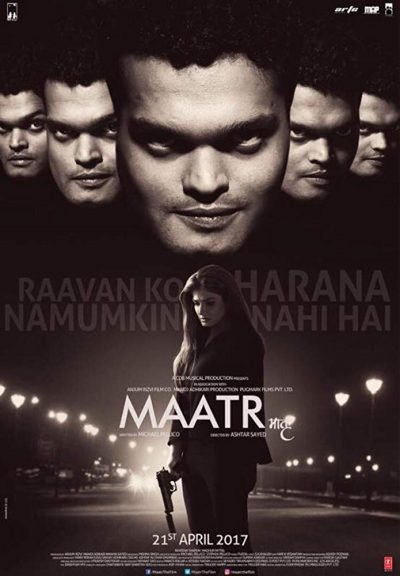 I was clued into this when researching my review of
I was clued into this when researching my review of  Within about two minutes of starting this, I realized I had made a terrible mistake, and was watching something barely reaching the amateur level of film production. Still, I soldiered on – albeit for some loose definition of “soldiered” – until the bitter end, mostly so I could issue an informed warning about this to any prospective viewers. Maxine (Mitchell) is rather upset when she discovers her boyfriend, music video producer Lance (Watts) has been cheating on her with Lana (Bryant). Mind you, she’s clearly a bit unhinged already: for example, telling him she’s pregnant when she isn’t. So it’s not much of a surprise when her reaction to his two-timing is to kidnap Lance, tie him up in her basement and submit him to various indignities, along with seeking revenge on Lana. Which, apparently, includes sleeping with her father (Walker).
Within about two minutes of starting this, I realized I had made a terrible mistake, and was watching something barely reaching the amateur level of film production. Still, I soldiered on – albeit for some loose definition of “soldiered” – until the bitter end, mostly so I could issue an informed warning about this to any prospective viewers. Maxine (Mitchell) is rather upset when she discovers her boyfriend, music video producer Lance (Watts) has been cheating on her with Lana (Bryant). Mind you, she’s clearly a bit unhinged already: for example, telling him she’s pregnant when she isn’t. So it’s not much of a surprise when her reaction to his two-timing is to kidnap Lance, tie him up in her basement and submit him to various indignities, along with seeking revenge on Lana. Which, apparently, includes sleeping with her father (Walker).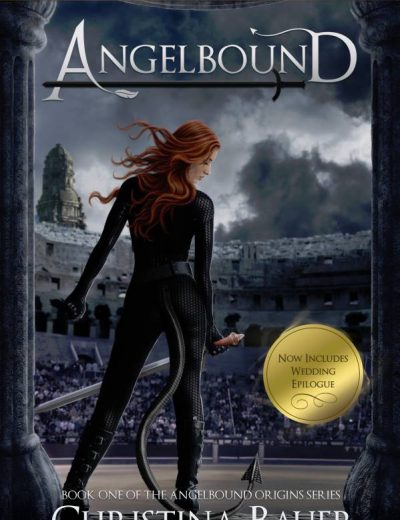 It’s nice to be reminded of why I’m generally averse to romance in my reading – particularly poorly written and unconvincing romance, like we get here. An interesting scenario with potential gets bogged down in gooey mush during the second half: let’s just say, there are phrases such as “my tummy goes all tingly again.” Yes: again… If I wasn’t already committed by that stage, being more than half-way through a 500+ page book, that sentence might well have led to this ending up as a Did Not Finish. Instead, I figured I’d at least get a review out of it. You’re welcome.
It’s nice to be reminded of why I’m generally averse to romance in my reading – particularly poorly written and unconvincing romance, like we get here. An interesting scenario with potential gets bogged down in gooey mush during the second half: let’s just say, there are phrases such as “my tummy goes all tingly again.” Yes: again… If I wasn’t already committed by that stage, being more than half-way through a 500+ page book, that sentence might well have led to this ending up as a Did Not Finish. Instead, I figured I’d at least get a review out of it. You’re welcome. This rating is perhaps influenced by my seriously low expectations here. Having seen my share of generic “female ninja” films, all too often they tend to be thinly-disguised exercises in soft-porn. Any action elements are usually secondary, at best. That’s not the case here. Well, at least, not entirely. You’ll not mistake this for Crouching Tiger, yet there has been some thought put into the plot and characters, and this helps elevate proceedings to the level of satisfactorily watchable. Which is, as noted, considerably more than I was anticipating. It comes as a pleasant surprise, especiallyfor a film so obscurist, the IMDb doesn’t recognize it, director Noto’s sole credits being as an assistant in that role. The Amazon Prime synopsis is also from
This rating is perhaps influenced by my seriously low expectations here. Having seen my share of generic “female ninja” films, all too often they tend to be thinly-disguised exercises in soft-porn. Any action elements are usually secondary, at best. That’s not the case here. Well, at least, not entirely. You’ll not mistake this for Crouching Tiger, yet there has been some thought put into the plot and characters, and this helps elevate proceedings to the level of satisfactorily watchable. Which is, as noted, considerably more than I was anticipating. It comes as a pleasant surprise, especiallyfor a film so obscurist, the IMDb doesn’t recognize it, director Noto’s sole credits being as an assistant in that role. The Amazon Prime synopsis is also from  There has been a whole slew of films over the year which have been based on the theme of “hunting humans”. Initially, this Australian entry seems to be going straight down the same line. Kayla (Dodds) has an argument in the street with her best friend. After the latter storms off, Kayla hears her shout for help, but while investigating, is herself abducted. She wakes to find herself in a crate in the middle of some very remote woods. She discovers other women in the same situation, and that they are being chased by beweaponed, masked men with
There has been a whole slew of films over the year which have been based on the theme of “hunting humans”. Initially, this Australian entry seems to be going straight down the same line. Kayla (Dodds) has an argument in the street with her best friend. After the latter storms off, Kayla hears her shout for help, but while investigating, is herself abducted. She wakes to find herself in a crate in the middle of some very remote woods. She discovers other women in the same situation, and that they are being chased by beweaponed, masked men with 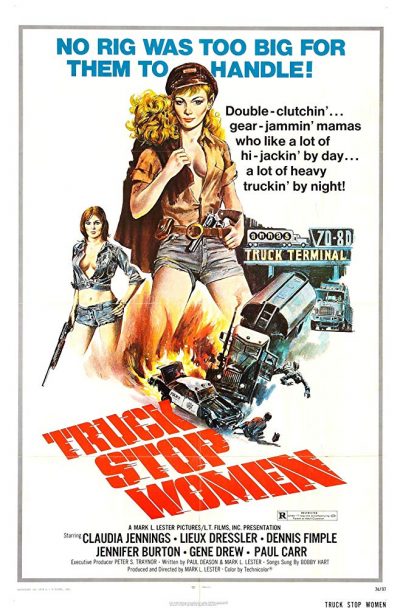 Ostensibly, Anna (Dressler) runs a New Mexico truck-stop, catering to drivers and ensuring they are kept fed and watered as they run their rigs across country. However, she has several more lucrative businesses. It seems that a majority of her waitresses, for example, moonlight as hookers in the brothel Anna runs. But the key side-line of work is sending her gals out to lure in unsuspecting truckers, typically with an alluring combination of fake breakdowns and tight shorts. When the truckers stop, their vehicles are hijacked, the contents stolen and the trucks themselves repainted and sold on.
Ostensibly, Anna (Dressler) runs a New Mexico truck-stop, catering to drivers and ensuring they are kept fed and watered as they run their rigs across country. However, she has several more lucrative businesses. It seems that a majority of her waitresses, for example, moonlight as hookers in the brothel Anna runs. But the key side-line of work is sending her gals out to lure in unsuspecting truckers, typically with an alluring combination of fake breakdowns and tight shorts. When the truckers stop, their vehicles are hijacked, the contents stolen and the trucks themselves repainted and sold on.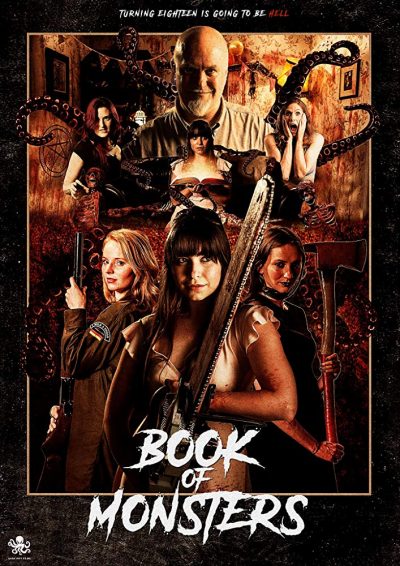 Ten years ago, the mother of eight-year-old Sophie (Craine) was attacked and killed by what her daughter insisted was a monster – a claim to which she held, resulting in her being institutionalized. Now, a somewhat recovered Sophie is about to enjoy her 18th birthday, having organized a party with her friends. But she’s about to discover that the monsters were very real, and just waiting for her to reach adulthood. Fortunately, Mom was a bit of a monster hunter, who conveniently left a book of helpful tips as well as a secret vault of tools and weapons. Together with her pals, Sophie is prepared to make a stand and defend her home against the attackers.
Ten years ago, the mother of eight-year-old Sophie (Craine) was attacked and killed by what her daughter insisted was a monster – a claim to which she held, resulting in her being institutionalized. Now, a somewhat recovered Sophie is about to enjoy her 18th birthday, having organized a party with her friends. But she’s about to discover that the monsters were very real, and just waiting for her to reach adulthood. Fortunately, Mom was a bit of a monster hunter, who conveniently left a book of helpful tips as well as a secret vault of tools and weapons. Together with her pals, Sophie is prepared to make a stand and defend her home against the attackers.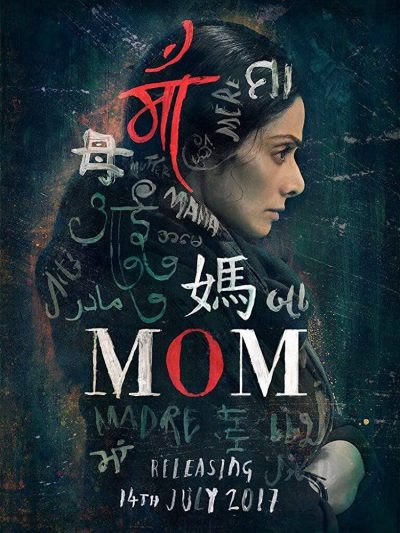 This strong Indian tale of revenge and (step)mother love was, sadly, the last major appearance for its star. Sridevi accidentally drowned in a Dubai hotel, a few months after the film was released. But it’s a wonderful monument to her talent. She plays Devki Sabarwal, a biology teacher who is having trouble in the relationship with her teenage step-daugher, Arya (Ali). But everything changes after Arya is abducted while leaving a party, raped and beaten, then thrown into a roadside ditch. The fact Arya had been drinking is used to discredit her testimony, and the absence of forensic evidence helps her attackers walk free. Blood relation or not, Devki isn’t having that. With the help of private eye DK (Siddiqui), she starts to impose her own kind of justice, despite the increasing suspicions of Detective Francis (Khanna).
This strong Indian tale of revenge and (step)mother love was, sadly, the last major appearance for its star. Sridevi accidentally drowned in a Dubai hotel, a few months after the film was released. But it’s a wonderful monument to her talent. She plays Devki Sabarwal, a biology teacher who is having trouble in the relationship with her teenage step-daugher, Arya (Ali). But everything changes after Arya is abducted while leaving a party, raped and beaten, then thrown into a roadside ditch. The fact Arya had been drinking is used to discredit her testimony, and the absence of forensic evidence helps her attackers walk free. Blood relation or not, Devki isn’t having that. With the help of private eye DK (Siddiqui), she starts to impose her own kind of justice, despite the increasing suspicions of Detective Francis (Khanna).
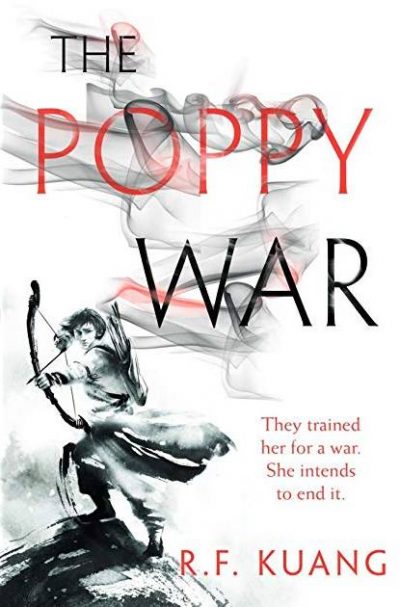 There can’t be many fantasy novels based on the events of World War II. But here we are, and Kuang has done an amazing job of taking historical events and weaving them into a saga of gods, magical powers and monsters, that works very well, even if you have no clue about the background.
There can’t be many fantasy novels based on the events of World War II. But here we are, and Kuang has done an amazing job of taking historical events and weaving them into a saga of gods, magical powers and monsters, that works very well, even if you have no clue about the background.